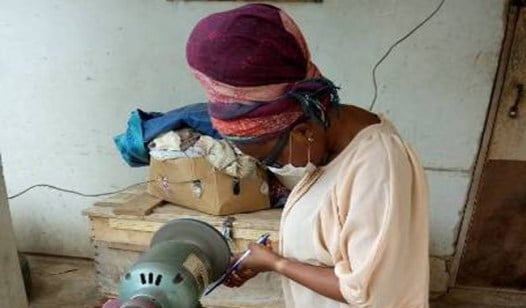Okikiola Fasanya, a university graduate turned shoemaker, is pursuing a career in a field dominated by men.
She studied history education at the Adeyemi College of Education, Ondo state.
Fasanya acquired the shoemaking skill while serving as a youth corps member in Ibadan, Oyo state. She was trained to build new shoes as well as repair worn-out ones.
“You can wear my footwear in the rain and it will not spoil because I dedicate all my time and attention into making just one and many more,” she told NAN.
She said while undergoing training, her boss treated her like every other trainee despite being the only educated one among them.
“My boss was strict. He would say that he was not going to pamper me because he discovered that I had the zeal to learn,” she said.
“Being lenient with me then would have led to me losing focus.”
ALL HAIL THE ‘STRONG LADY’
Fasanya said her male colleagues appreciate her designs and see her as a “strong lady”.
“I get motivated to do more so people can know that success is not by gender, but through hard work,” she said.
“Some of my male counterparts see me as a strong lady.
“They love my designs and applaud the fact that I go through the stress of building new shoes on my own rather than employ people.”
The success-driven craftswoman chose shoemaking because she wanted to promote the production and the wearing of local shoes and sandals by Africans, thus promoting the African culture.
“I felt the need to create job opportunities for people instead of being the one hunting for jobs,” she said.
“Also, the love my brothers have for locally-made shoes and slippers inspired me to start a business in this line.”
‘ I’M READY TO GET MY HANDS DIRTY’
Fasanya said she discovered that the major raw materials: animals’ hides and skins; were available locally and in large quantities.
According to her, most of what goes into the production of her products are local contents relevant to and available in the country.
She said: “I tell my clients that I am ready to get my hands dirty to make their feet lovely.
“I go the extra mile to satisfy my clients by paying more attention to the smallest details of shoemaking.”
Fasanya advised those searching for white-collar jobs to acquire skills in various vocations that would make them relevant to their communities.
She said they would also become self-reliant, self-dependent and be employers of labour with time.
Copyright 2025 TheCable. All rights reserved. This material, and other digital content on this website, may not be reproduced, published, broadcast, rewritten or redistributed in whole or in part without prior express written permission from TheCable.
Follow us on twitter @Thecablestyle

